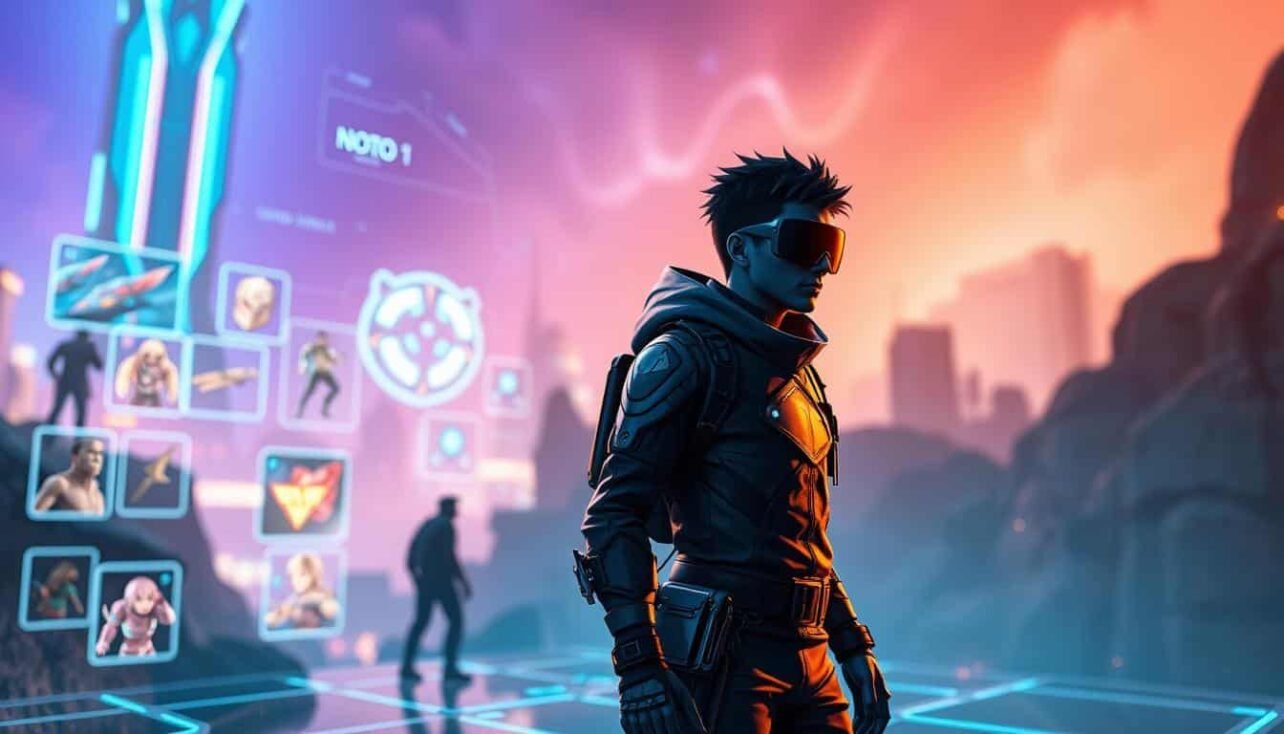The digital world is changing fast. A new kind of gaming experience is here. It blends fun with real economic opportunities.
This innovative model uses blockchain technology. It allows dedicated players to earn real money for their skills. This guide explores how this exciting system works.
Financial barriers often block people from joining new virtual economies. This system removes that wall. It creates a fair path for global participation.
Asset owners, gaming guilds, and aspiring gamers connect. They build a community that benefits everyone. Value grows through active participation and smart ownership.
This represents a major shift from traditional video games. Now, your time and talent can lead to tangible rewards. It’s a revolution in how we think about interactive entertainment.
Key Takeaways
- A new gaming model merges entertainment with real-world income potential.
- Blockchain technology enables players to earn rewards for their in-game efforts.
- Financial obstacles are removed, allowing wider global access to these economies.
- The system connects various stakeholders in a mutually beneficial ecosystem.
- This represents a significant shift from traditional, non-earning gaming experiences.
- It opens up significant economic opportunities for skilled individuals worldwide.
Understanding the Play-to-Earn Revolution
Traditional gaming models are being fundamentally challenged by decentralized alternatives that reward player participation. This movement represents a dramatic departure from conventional systems where digital achievements had no real-world value.
The Shift from Traditional Gaming to Blockchain-Based Models
For decades, video games operated within closed ecosystems. Developers maintained complete control over all digital assets. Players could not transfer or monetize their in-game accomplishments outside the platform.
Blockchain technology changes this dynamic entirely. It creates transparent, decentralized economies where participants have true ownership. This empowers individuals to benefit directly from their time and skill investments.
How NFTs Redefine In-Game Economies
Non-fungible tokens introduce verifiable scarcity and ownership to digital items. Characters, weapons, and virtual land become unique assets with provable rarity. These digital collectibles can be freely traded on open marketplaces.
The economic impact is significant. Players can earn cryptocurrency and real money through skilled gameplay. This creates new income opportunities previously unavailable in traditional gaming environments.
Industry experts predict this model will become standard. As one Reddit founder noted, most gamers will soon expect proper valuation of their time. The revolution transforms entertainment into productive economic activity.
What Are NFT Scholarship Programs Play to Earn?
High entry costs create significant barriers for new participants in blockchain gaming economies. The scholarship model emerged as an innovative solution to this challenge. It enables access for talented individuals who lack the capital for initial investments.
Defining the Scholarship Model and Its Benefits
This approach began with the Axie Infinity community. Asset owners recognized that many skilled players couldn’t afford the required digital pets. They developed a system where owners lease their assets to newcomers.
The recipient, called a scholar, provides time and dedication instead of money. This creates immediate earning opportunities without financial risk. Both parties benefit from the revenue-sharing arrangement.

The Role of Incentives for Players and Guilds
Gaming guilds now organize these initiatives at scale. They purchase assets and match them with qualified candidates. This system maximizes asset utilization while creating income streams.
Earnings typically follow a clear distribution pattern. Scholars receive the majority share for their gameplay efforts. Managers and guilds get smaller percentages for their organizational roles.
This structure creates aligned incentives for everyone involved. It represents a sustainable way to grow gaming communities while providing economic opportunities.
Role of Scholarship Managers and Gaming Guilds
Local leaders form the backbone of the new gaming economy, connecting capital with talent. These dedicated professionals serve as the critical link between large organizations and individual participants.
They identify promising candidates within their communities and provide essential support systems. This decentralized approach enables massive scale while maintaining personal connection.
Responsibilities and Impact of Scholarship Managers
These managers handle recruitment, training, and ongoing mentorship for new participants. They distribute digital assets and ensure players understand game mechanics thoroughly.

The role extends beyond basic instruction to include strategic development. Managers help participants maximize their potential through personalized coaching.
Trust-building remains essential for successful community growth. Consistent communication creates supportive environments where skills flourish.
| Manager Type | Primary Focus | Key Responsibilities | Community Impact |
|---|---|---|---|
| Regional Manager | Cultural adaptation | Localized onboarding, language support | Builds region-specific communities |
| Game Specialist | Technical expertise | Advanced strategy, performance tracking | Creates game-focused knowledge hubs |
| Development Coach | Skill building | Financial education, personal growth | Enhances long-term participant success |
| Community Leader | Network expansion | Recruitment, conflict resolution | Strengthens local ecosystem connections |
Community Building Through Regional SubDAOs
Organizations establish specialized branches for different regions and game titles. YGG SEA serves Southeast Asia while IndiGG focuses on Indian markets.
This structure allows for customized support strategies that respect local cultures. Game-specific groups like YGGSPL create deep expertise within particular virtual worlds.
Platforms like Merit Circle’s community space facilitate peer learning. Experienced coaches guide newcomers through game challenges and financial concepts.
This business development approach creates sustainable growth. For a deeper understanding, see this comprehensive guide to this ecosystem.
Market Opportunities and Investment Considerations in NFT Gaming
The blockchain gaming sector presents unique investment dynamics that require careful analysis. This emerging market combines traditional investment principles with digital asset management.
High entry costs for popular titles create significant capital requirements. This barrier opens opportunities for investors to participate through asset leasing schemes.

Legal Insights and Contractual Frameworks
Proper legal structures protect all parties involved in gaming investments. Ownership rights must be clearly defined in all agreements.
Investors should consult legal experts to ensure compliance with local regulations. This prevents potential classification as employment contracts.
Financial Risks, Rewards, and Future Trends
The financial landscape involves both volatility and potential returns. Token prices can fluctuate dramatically based on game popularity.
Successful investors diversify across multiple titles and regions. This strategy mitigates risks while maximizing earning potential.
Integrating Play-to-Earn with Traditional Investment Models
Digital assets can be treated similarly to traditional income-generating properties. They represent a new asset class with unique characteristics.
This integration requires understanding both gaming mechanics and investment principles. The combination creates innovative business models for capital growth.
Conclusion
A new paradigm in interactive entertainment is reshaping how value is created and distributed within virtual worlds. This innovative approach connects dedicated players with economic opportunities previously unavailable in traditional gaming environments.
The model has demonstrated remarkable effectiveness in creating sustainable ecosystems. Both scholars and asset owners benefit from aligned incentives that reward skill and commitment. As the industry evolves, we can expect more sophisticated platforms and stronger community support systems.
For individuals interested in participating, developing gaming expertise and connecting with reputable organizations remains crucial. This transformative space continues to offer money-earning potential while building vibrant digital communities around shared interests and mutual success.
FAQ
What is a play-to-earn gaming model?
Play-to-earn is a blockchain-based gaming model where players can earn real-world value. By using non-fungible tokens (NFTs), in-game assets like characters and items are owned by the player. These digital assets can be traded or sold in open markets, creating economic opportunities.
How do gaming guilds like Yield Guild Games operate?
Gaming guilds act as investment and community hubs. They acquire valuable in-game assets, such as Axie Infinity creatures, and lend them to players through scholarship schemes. This allows people without upfront capital to participate, sharing the generated revenue between the scholar and the guild.
What are the main responsibilities of a scholarship manager?
A manager oversees the program’s success. Their duties include recruiting and training scholars, monitoring performance, and ensuring fair profit-sharing. They also handle asset management and maintain community engagement, which is vital for sustainable growth.
Are there financial risks involved in these programs?
Yes, there are risks. The value of digital tokens can be volatile. Game economies may change, and smart contracts need careful auditing. It’s crucial to understand the market and legal frameworks before investing time or capital.
How do these programs benefit people in developing economies?
They provide significant opportunities. Players in regions with fewer jobs can earn an income by playing games. Guilds like Axie Infinity’s have created new revenue streams, offering a unique way for people to gain financial independence through gaming.
What is the future of the play-to-earn market?
The sector is evolving rapidly. Expect deeper integration with traditional finance and more sophisticated games. The development of subDAOs (decentralized autonomous organizations) will likely foster stronger, region-specific communities and governance models.


No comments yet